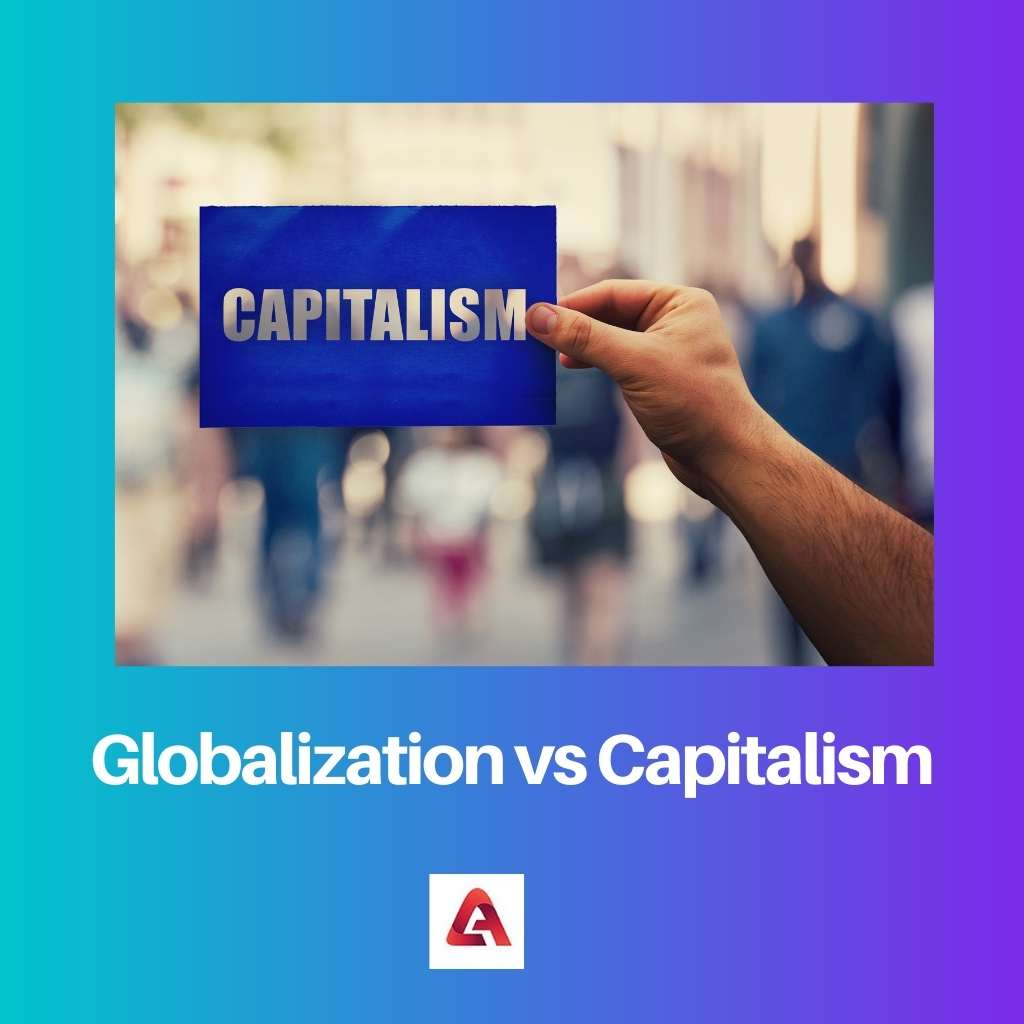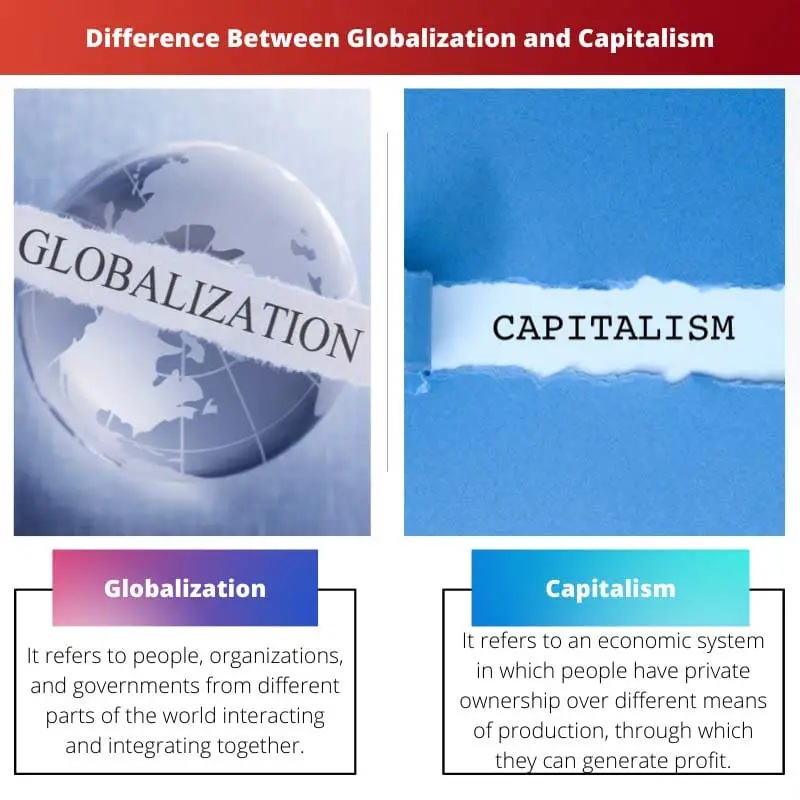An economic system is a crucial structure within which a country or state functions. Without it, there would be utter indisposition and chaos among people and organizations. However, not all systems work similarly or have similar effects. Globalization and capitalism are two concepts related to this subject.
Key Takeaways
- Globalization refers to integrating economies, cultures, and politics globally, while capitalism is an economic system based on private ownership of resources and profit generation.
- Globalization encourages interdependence among countries, but capitalism focuses on competition and individualism.
- Globalization can lead to exchanging of ideas, technologies, and resources, while capitalism emphasizes wealth accumulation and economic growth.
Globalization vs Capitalism
Globalization has increased interconnectedness and interdependence, increasing trade, investment, and migration, with significant social, economic, and political impacts. Since the Industrial Revolution, capitalism has been the dominant financial system, driving innovation, economic growth, and rising living standards.

Since the 18th century, globalization has become more and more popular. A reason for this is the advancement in communication, technology, and transportation. Each of them has helped people across the world connect. As a result, there has been an exponential development in world trade and even cultural exchange.
However, unlike globalization, a broad concept, capitalism is a specific economic system. It could be traced back to the 16th century, when it rose to massive prominence. Most parts of the world have adopted capitalism in today’s time. As a result, there is enormous competition between private business owners.
Comparison Table
| Parameters of Comparison | Globalization | Capitalism |
|---|---|---|
| Meaning | It refers to an economic system in which people have private ownership over different means of production through which they can generate profit. | It has led to an exponential world trade and cultural exchange development. |
| Nature | It is a general and broad term with several contexts. | It is a specific type of economic system. |
| Origin | It can be traced back to the 18th century. | In its earliest forms, it can be traced back to the 16th century. |
| Effect | It has lto massive competition between private business owners. | It is argued that globalization has caused inter-ethnic tension, violence, and glorification of the West. |
| Criticism | It is argued that globalization has caused inter-ethnic tension, violence, and glorification of the west. | It is argued that capitalism is unstable, exploitive, anti-democratic, and inefficient. |
What is Globalization?
In the 18th century, there was massive development in communication, transport, and technology. This enabled people worldwide to communicate, exchange ideas and cultures, and even carry out international trade. Such a concept was termed globalization. It essentially involved the process of different countries connecting and working with one another.
Primarily, globalization can be considered an economic affair, as it has enormous influences on economies. However, there are various cultural and social aspects related to it as well. The internet has facilitated the worldwide consumption of popular artistic media. It has led to the exchange of ideas, beliefs, and even religions.
A great example of globalization is the modern Olympic Games, in which more than 200 nations participate. Another example is the FIFA World Cup which is viewed by people on an international level.
However, many people have criticized globalization as well. It is argued that the process has led to inter-ethnic tension between countries because of political and sometimes even religious reasons. This has caused a lot of violence and misfortune. Moreover, people even argue that 3rd world countries end up glorifying the West, leading to a downfall in their own local cultures.

What is Capitalism?
Unlike globalization, capitalism is a specific kind of economic system. It can be traced back to the 16th century when the feudal agricultural system was breaking down, and fewer people could own private lands. In today’s time, however, capitalism has become one of the most popular economic models.
It essentially refers to a system in which people own private lands and businesses. Here, they can conduct the production of goods and services. As a result, they can generate profit for themselves. The system allows these people to make decisions and investments based on their abilities and wealth.
A great example of a capitalistic economy is Hong Kong. Despite being a part of the particular administrative region of China, it has a separate economy. It is one of the most competitive markets in the world, in which people from all over the world trade and invest.
However, there has been widespread criticism and even anti-capitalistic movements. This is because many believe it is unstable, exploitative, anti-democratic, and inefficient. People argue that it ignores social welfare and makes the rich more prosperous, and the poor poorer. To support this statement, there have been many examples of exploitation of human rights in factories that mass-produce goods.

Main Differences Between Globalization and Capitalism
- Globalization refers to people, organizations, and governments from different parts of the world interacting and integrating whereas capitalism refers to an economic system in which people have private ownership over different means of production through which they can generate profit.
- Globalization is a general and broad term with several contexts, whereas capitalism is a specific type of economic system.
- Globalization can be traced back to the 18th century whereas capitalism, in its earliest forms, can be traced back to the 16th century.
- Globalization has led to an exponential development in world trade, and even cultural exchange whereas capitalism has led to massive competition between private business owners.
- Globalization is believed to have caused inter-ethnic tension, violence, and glorification of the West whereas capitalism is believed to be unstable, exploitive, anti-democratic, and inefficient.

- https://journals.sagepub.com/doi/abs/10.1163/156916304322981668
- https://journals.sagepub.com/doi/abs/10.1177/0022343313497739

I found the examples of globalization and capitalism quite enlightening, and the article helped me gain a deeper understanding of these complex concepts.
The irony behind the glorification of the West in globalization and the overlooking of social welfare in capitalism is striking. This article is thoughtfully written and thought-provoking.
This article is well-structured and provides a fascinating comparison between two essential concepts.
I must say the section on the criticism of globalization and capitalism was rather thought-provoking. The article’s approach to discussing both sides adds great complexity to the issue.
The article provides a well-detailed comparison between globalization and capitalism and their origins. I agree with the article’s conclusion on the economic system’s impact.
This article sheds light on the positive and negative aspects of globalization and capitalism. The arguments provided have given me much to reflect upon.